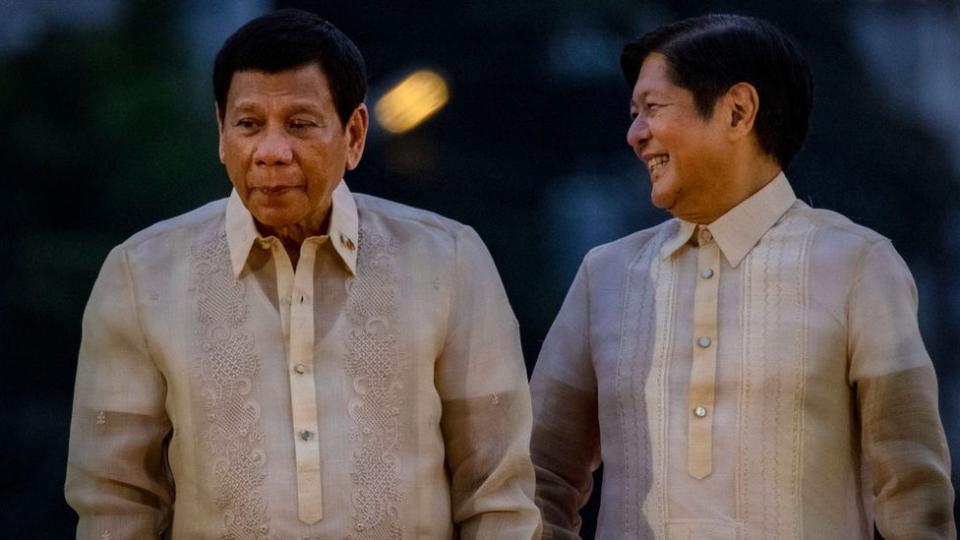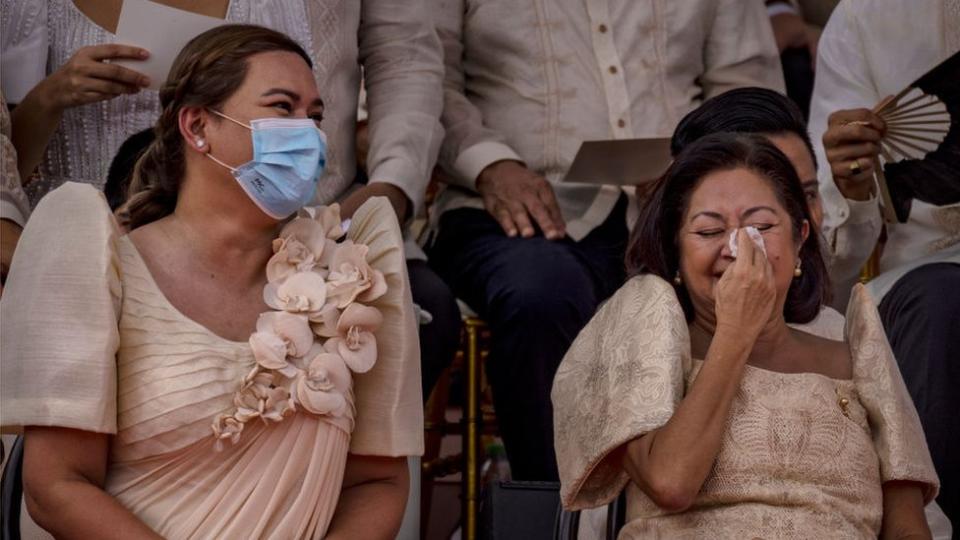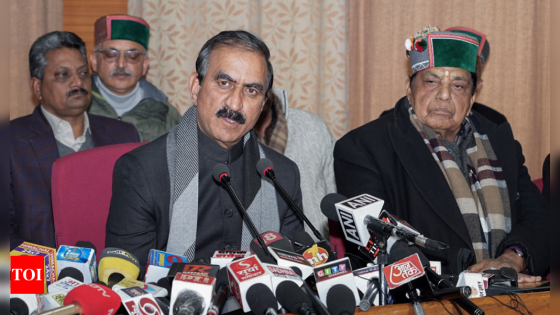With his signature bombast, former Philippine President Rodrigo Duterte told a crowd of cheering supporters in January that his successor was a drug addict. The man who replaced him, Ferdinand “Bongbong” Marcos Jr, shot back, saying the former leader must have hurled the insult in an opioid-fuelled haze.
That was the strongest sign yet of a crack in the alliance that catapulted Mr Marcos to a historic win in 2022. His ally: Vice-President Sara Duterte, the former president’s daughter.
From the start, analysts had predicted a divorce between the two most powerful Philippine political dynasties. The likelihood only increased amid public spats and growing differences over political agendas.
And yet splitting up might not be an option for Mr Marcos and Ms Duterte, who sold themselves to voters as the “UniTeam”.
Cracks in the alliance
Sara Duterte had been leading opinion polls as a possible presidential candidate when she announced in 2021 that she was running for the vice-presidency.
Her father made his displeasure clear. She was seen as his political heir – she was the mayor of Davao City, a post Mr Duterte held for many years before he became president in 2016.
But her alliance with Mr Marcos, the son of the disgraced former Philippine dictator Ferdinand Marcos, did not surprise analysts. They said both candidates risked defeat by splitting their support – hers in the south, his in the north – if they ran against each other. Together, they united their respective strongholds and won a clear majority.
Many expect Ms Duterte to run for president in 2028. The constitution bars Mr Marcos from seeking a second six-year term – a restriction that he is trying to remove, the Dutertes allege.
Mr Marcos says he supports reforms that will ease rules for foreign businesses, drawing more investment and jobs to the South East Asian nation of 100 million people. But his critics say it is a “sinister” ploy to usher in political changes that will allow him to run for the top job again. The fact that the term-limit was imposed in 1986, after his father was ousted from power by a popular revolt, has only added to the chorus of protest.

But this is not the only source of contention. Mr Marcos has made comments that appeared to be critical of Mr Duterte’s violent war on drugs that claimed thousands of lives and turned him into an international pariah. Rights groups say killings have continued, but police say there have been fewer of them under the new president.
Mr Marcos has also embraced the US, reversing his predecessor’s pivot to Beijing. He has granted American troops wider access to military bases, scaled up annual military drills and has used the Philippines’ strategic position in the Pacific to shore up support not just from Washington, but also Japan. And he hasn’t backed down from a deadly cat-and-mouse game with the Chinese in disputed waters.
Mr Duterte, on the other hand, had refused to even invoke the Philippines’ victory in an international tribunal against Beijing’s South China Sea claims during his term. He sought closer ties with China, partly in response to the condemnation from the West over his drug war.
There were smaller spats too. Ms Duterte was appointed the education minister in the Marcos government, despite publicly saying she wanted to be the secretary of defence. She said she accepted it to avoid any talk of a rift. She was heavily scrutinised by parliament last year over her request for millions of pesos in “confidential funds” – discretionary spending that government agencies are allowed. Then Mr Marcos’ allies cut her discretionary budget, a move that was both embarrassing and infuriating.
A high-stakes soap opera
Through all this, the two have avoided attacking each other directly – perhaps signalling a united front for now. But others on either side clearly want the upper hand in the court of public opinion, says political scientist Cleve Arguelles, president of polling firm WR Numero.
In April, after the two leaders accused each other of being drug addicts, First Lady Liza Araneta-Marcos sat down for a candid interview on YouTube.
She said she was “hurt” that Sara Duterte did not intervene when her father called the president a “junkie”. In a swift video reply, Ms Duterte said the first lady’s “personal feelings” were not part of her job.
Mrs Marcos has never discussed politics publicly. This surprising interview was an attempt to “beat the Dutertes at their own game”, Mr Arguelles says.
She cannot match Mr Duterte’s shocking comments – he’s notorious for sexist remarks, cursing at Pope Francis and former US president Barack Obama. But she can and did invoke a soap opera character that is reviled yet watched by millions of Filipinos – the traitor.
“The first lady is trying to use emotions rather than framing it in other ways. We have notions of treachery, the family being hurt,” Mr Arguelles said. “It’s like a soap opera.”


He says it’s very different to the Dutertes, who are “masters of… very public criticism”.
Mr Duterte has routinely criticised Mr Marcos for being a “weak” leader – a message now echoed by his son Sebastian, the mayor of Davao City, who has even called on the president to resign.
“The Marcoses are forced to respond. Otherwise, they’ll be left behind,” Mr Arguelles says.
For Ms Duterte, abandoning the alliance now means being shut out of government. It could also open her father to prosecution in the Philippines and abroad over allegations of hundreds of suspected drug users being killed by police during his term. Mr Marcos’ current position is that the International Criminal Court has no authority to investigate Mr Duterte.
It could also hurt her chances in 2028. Filipino voters don’t like to see their president and vice-president fighting, Mr Arguelles said. The last two VPs lost their presidential bids after falling out with the presidents they ran alongside.
“There’s a practical necessity for them to stay together,” he adds until the mid-terms in 2026, which will serve as a referendum on the incumbents. Both sides will be hoping to win the parliament and local bodies, which will boost their respective political agendas.
“If they are divided, they’re going to be really vulnerable,” Mr Arguelles said. “It’s going to be anybody’s ball game.”
Source Agencies

